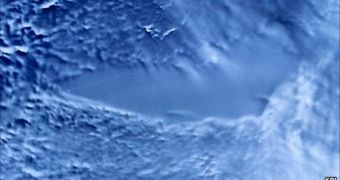If and when robotic spacecraft or human explorers reach the surface of Jupiter's icy moon Europa, they could begin exploring it based on data collected by a team of Russian experts currently digging their way into Lake Vostok.
This particular lake is very special. Buried under 2 miles (3.7 kilometers) of Antarctic ices, the landscape feature has been separated from the outside world between 34 and 14 million years ago.
This means that whatever lifeforms existed within the lake at that particular time were trapped there, without the possibility of communicating with the outside world, for millions of years. It could even be that evolution took a different course there.
While this investigation has the potential to change the way we understand evolution and adaptation, some could not help but note the similarities between Lake Vostok and environments such as those on the Jovian moon Europa, or Saturn's moon Enceladus.
Both of these celestial objects are covered in a very thick layer of ice, underneath which experts believe liquid oceans can be found. If that is the case, then those environments too have been separated from the outside world and, importantly, protected from space radiations, for a very long time.
The downside to all of this is that the Russian team that set out to dig its way to Lake Vostok took about a decade to reach its surface. The momentous achievement took place on February 5, 2012.
“When it comes to Europa, there's no better analog on Earth than Lake Vostok. In both cases, the liquid water envelope trapped beneath the ice is cut off from the Sun,” NASA Jet Propulsion Laboratory (JPL) Solar System Exploration Deputy Chief Scientist, Kevin Hand, tells Space.
One of the most significant differences between Lake Vostok and the liquid ocean inside Europa – other than the fact that they're not on the same planet – is that the latter lies underneath a 10-mile (15-kilometer) thick ice sheets. Getting to it will therefore be extremely difficult.
“Europa is the premier place to search for the second origin of life in the solar system,” Hand says. There is currently some debate as to whether the Saturnine moons Enceladus and Titan (which features a hydrocarbon-based cycle) might be able to support life as well.
“If we do find a living ecosystem in Lake Vostok, [then] learning about what makes that ecosystem tick, what allows that life to arise and thrive, could provide guidance for how to look for and understand the potentially habitable environment of Europa,” the JPL investigator concludes.

 14 DAY TRIAL //
14 DAY TRIAL //